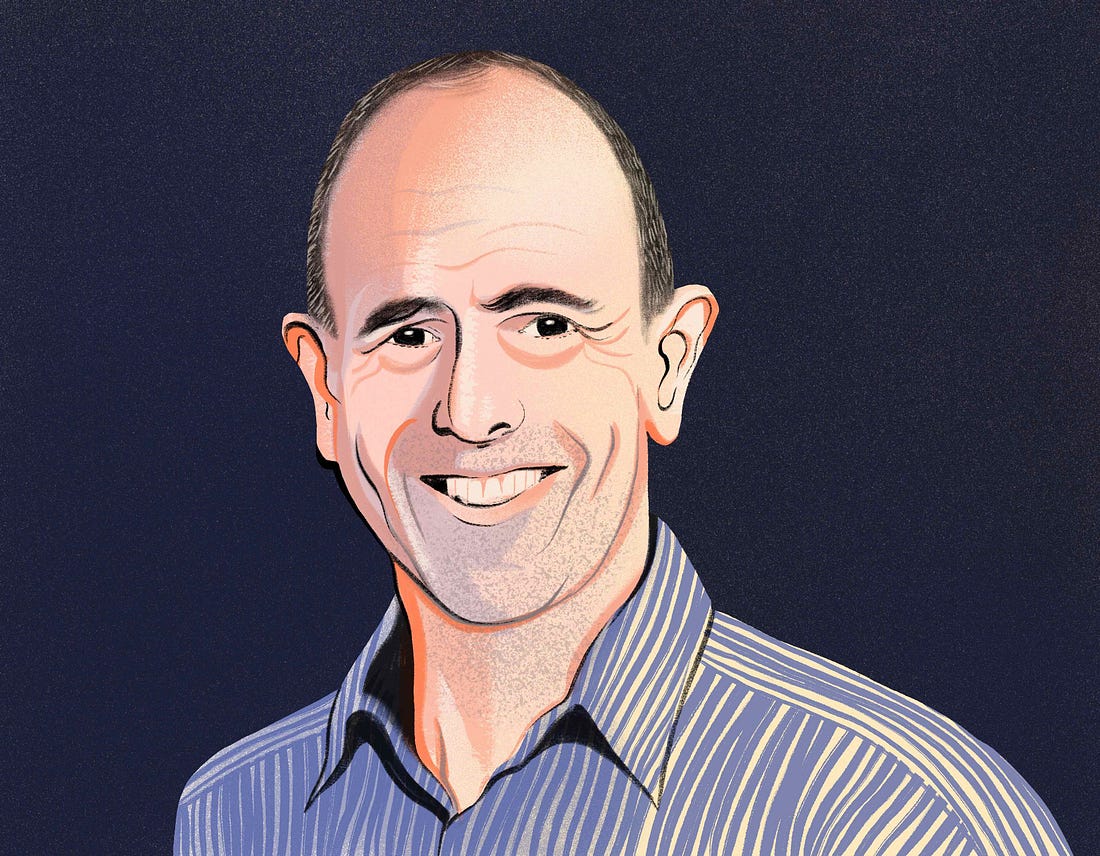|
Modern Meditations: Keith Rabois
The venture capitalist on Margaret Thatcher, identifying breakout talent, and why you should add stress to your life.
“Some of the best analytical work out there - we learn something new from every post!” - Peter, a paying subscriber
Friends,
If you want to, you can divide the world into two tribes.
There are the People of Certainty and the People of Doubt. I belong to the latter camp. There is no opinion I hold unequivocally. Everything looks probabilistic if I inspect it closely enough.
This posture means that when I encounter someone from the other tribe, a Person of Certainty, I find myself a little stupefied. How can anyone believe something so fully? How can they know, in themselves, so many things with such clarity?
Providing they are not weak-minded or boorish, these people make the best conversationalists. They do not hedge or waffle, they are unlikely to backtrack; they emblazon the air with their opinions. Hearing them is an invitation to a different kind of thinking, into a strangely vivid reality.
Keith Rabois is one of these conversationalists, a high priest among the People of Certainty. Though you might not agree with his battle against the evils of stretching or share his veneration for Margaret Thatcher, his mind undeniably fizzes with inventive ideas colored by a trademark surety.
That mind, combined with a ferocious drive that still animates him 25 years into his tech career, has made Keith one of the most consistent hitmakers in the industry.
Arguably, no one else has succeeded so completely as an operator, investor, and founder. As an operator, Keith helped build PayPal, Square, and LinkedIn into multi-billion-dollar behemoths. As an investor, he’s backed a steady stream of unicorns, including Ramp, DoorDash, YouTube, Airbnb, Stripe, Webflow, Checkr, Faire, Palantir, Udemy, Trade Republic, and Affirm. As an entrepreneur, Keith is best known for launching real estate company Opendoor, which hit an $18 billion valuation as part of its public market push before fading in the following years. He is now back in the founder’s seat (while also investing at Khosla Ventures), serving as CEO of OpenStore, an e-commerce rollup.
All of which is to say that there are no guarantees in tech, a land governed by the Power Law, but Keith Rabois comes ludicrously close.
In this edition of Modern Meditations, Keith and I discuss his passion for EDM, how he identifies exceptional talent before they’ve proven their abilities, what Reid Hoffman said about Max Levchin, why he believes in “input-driven” management, and why he believes everyone should increase their stress levels.
To unlock The Generalist’s full library of interviews, case studies, and tactical guides, consider becoming a premium subscriber today. For $22/month, you’ll discover breakthrough startups, hear from investing legends like Keith, Reid Hoffman, Kirsten Green, Ho Nam, and Vinod Khosla, and access the playbooks of elite founders.
Modern Meditations: Keith Rabois
What would you be doing if you didn’t work in tech?
Possibly politics. There are attractive aspects to it, like the potential impact you can have. But there are significant downsides, too.
Politics is more of a zero-sum game. By definition, if one person is appointed to a role, it means a hundred people are not. Technology, by contrast, is almost never zero-sum. If I build a successful startup, that doesn’t foreclose your ability to build one, too. Working in a non-zero-sum field is exciting.
I didn’t always know I would work in technology, of course. Up until 2000, I had followed a pretty canonical legal trajectory: I attended a top-tier law school, clerked for Edith H. Jones, an extremely well-known federal appellate court judge, then spent three-and-a-half years as an associate at Wall Street’s most prestigious firm, Sullivan & Cromwell. I was going down the most conventional, credentialist path possible, with politics looking like the road ahead.
Then, in February 2000, I dropped out completely to jump into the technology revolution. It was right at the height of the dot-com bubble and six weeks later, the entire market collapsed. My choice of direction might have been right, but the timing was disastrous. Twenty-four years later, with the benefit of hindsight, it worked out fine.
It was a radical switch for me – I had been a litigator, not a transactional attorney. And law is, in many ways, the antithesis of entrepreneurship. You spend your time mostly thinking about what can go wrong, not what can go right.
Instead of taking an intermediary role by joining a legal department at a tech company, I switched cold turkey, joining Voter.com to do business development before heading to PayPal. Just, “I’m jumping out completely, and I’m going to be 100% a business person.” I wanted to grow revenue lines and learn how to do that, even though I’d never used an Excel spreadsheet in my life. Fortunately, I’m past the point where I have to use Excel now, but the first five years were rough.
What craft are you spending a lifetime honing?
Talent spotting. There’s a common denominator between building a company and being an early-stage investor – it’s identifying the alpha in people.
The technique differs when applied to founders versus employees, but in both cases, you’re trying to identify the highest-potential people on the planet as early as possible in their trajectory. That’s the art of venture capital, and to some extent, it’s how you scale a high-tech company.
At Khosla Ventures, our mantra is to be “bold, early, and impactful.” “Early” means I want to be the first institutional capital in every single company of note. The only way to do that is by having an unfair advantage in attracting and assessing undiscovered talent.
It’s easy to state that conceptually, but extremely difficult to do. Even meeting those people is hard, let alone assessing them before they have any proof points. But if you do it well, it’s very rewarding financially and psychologically.
One of the reasons it’s so hard? Because there’s no common pattern. What makes Mike from Traba special is very different from what makes Eric at Ramp compelling and unique. They’re both going to build iconic companies, though. Because there’s no formula, it’s rare to be a proficient talent spotter, and even if you are, it’s challenging.
The most common denominator, at an abstract level, is that the person is between the top 1 basis point and top 10 basis points at something. To simplify it, when I walk out of a meeting with a founder that has that kind of high potential, I usually say to myself, “Wow, I’ve never met anybody like that before.”
What I mean is that the founder is the best I’ve ever seen on a certain dimension. They could be the smartest person, most tenacious, most analytically rigorous, or have the greatest sales ability, best design instincts, or the strongest reality distortion field. But on some dimension, I have to feel like they are in the top 1 basis points. If you don’t feel that, they’re probably not going to be a super successful founder.
There is a slight variation on this to look out for. Sometimes, you find someone with an overlap of traits that are rarely combined. I remember Reid Hoffman sitting me down in December 2000 and explaining to me why Max Levchin was so special. “Max is a first-rate technologist. Max is a first-rate business mind. There are less than five of those people in the world.” This was long before Max had proven his talent, but Reid understood that he had this unusual Venn diagram overlap.
Jack Dorsey is another example of this: a first-rate mind, a first-rate business strategist, and a reasonably good technologist. That’s an incredibly rare combination. His design talent showed up in different ways. For example, at Square, he spent so much of his time recruiting Robert Andersen. Simply knowing that Robert was the single best person in the world to recruit takes talent.
What is the most significant thing you’ve changed your mind about over the past decade?
Inputs versus outputs. When I started my career at PayPal, we were an outputs-driven organization. Now, I’ve flipped pretty much 180 degrees to believing in inputs-driven organizations.
There are successful examples of both approaches in technology. Apple and Amazon are more input-driven, while Meta and Google are more output-driven. I don’t think it’s impossible to succeed with either approach, but I’ve found that one style works better for me.
My experiences at Slide and Square informed my opinion here. Slide was output-driven and not successful, while Square was 100% inputs-driven and very successful.
In terms of newer companies, I would say that Basis, which does AI accounting, is very inputs-driven. They spent two years building the perfect product. They really obsessed over it, believing that customer adoption and revenue will take care of themselves once you have a high-quality product.
Meanwhile, Traba is a bit of a hybrid, though probably a little further on the output side. They manage through OKRs very aggressively, which is a classic part of output philosophy. The reason it’s a bit of a hybrid is that they’re also strict on the input side with their 9-9-6 culture and expectation of being in the office 80 hours a week.
There’s a great book on input-driven company building by football coach Bill Walsh called The Score Takes Care of Itself. It perfectly captures the methodology for building an input-driven, successful organization. I recommend that book to all of the entrepreneurs I work with. It has some overlap with Andy Grove’s High Output Management, but as the title implies, it’s output-driven. Over my career, I’ve transitioned from high-output mode to high-input mode.
Which current or historical figure has most impacted your thinking?
Margaret Thatcher. Almost everything important you need to learn, you can learn from her career. She’s been my idol since I was in junior high school, maybe even earlier. To me, she’s an example of principled leadership, not accepting the status quo or inertia, and always doing the right thing, even when that wasn’t popular.
The reality is that the UK was basically falling apart. It was a corrupt, socialist, non-egalitarian, elitist world. Thatcher reinvigorated the country in many, many different ways through her force of will, energy, and intelligence.
I’ve adopted some of Thatcher’s expressions so thoroughly that I forget they derive from her. It’s only when I watch a movie about her life or reread her autobiography that I realize. My favorite expression of hers is “No, no, no.”

There are many good applications of that phrase – both of my kids like to mimic me, saying, “No, no, no” all the time. It’s turned into a bit of a caricature with them already. But there’s real value in it – it represents good discipline. There’s the famous Steve Jobs speech that describes focus as saying no to a thousand things to excel at just one. There’s also the sense in Thatcher’s words of not going along with the crowd or accepting conventional wisdom. It’s my favorite expression – maybe in the world.
As rough introductions go, the recent seasons of The Crown are pretty good, though they’re a little bit distorted by left-wing biases. If you want to read more rigorous materials, there’s a great chapter in Kissinger’s last book (Leadership: Six Studies in World Strategy); for political types, her collected speeches are worthwhile, and the first volume of her autobiography charts her political career amazingly well. It also captures the weakness of other people – those from elite and entitled backgrounds who were envious of her success and conspired to depose her. Thatcher never lost an election; in fact, she technically never lost a leadership election within her party. Still, the insiders, with their envy and jealousy and pettiness, combined to force her out of power.
The Conservative party has never really rebounded, in my opinion. It’s been a bunch of mostly bland politicians, which is why they’re out of power. Because Labour is so bad, I think there will eventually be a fresh face that re-energizes the Conservatives, just like what happened in the United States with Trump.
What is your most contrarian but high-conviction opinion?
Unfortunately, my views are moving into the mainstream so fast that I don’t know what to choose anymore. All my pseudo-conspiracy theories are becoming accepted wisdom. A decade ago, I had between 5-15 ideas that were pretty out there. All of them are now somewhere between 90% and 99% accepted. So, I have to go back to the drawing board.
I remember that in March 2013, I got about 10 friends together for my birthday. I went through all these kinds of crazy “Keith precepts,” trying to convince people to form a Rabois Institute with me to publish studies supporting my ideas. One of the major ones for the Rabois Institute to study was going to be the importance of sleep. I had this long-standing view that the most important thing you could do to improve your happiness, health, and wealth was to sleep better. Even in 2013, that was incredibly controversial; now, I think it’s almost banal.
Two other ideas I’d cite:
First, I think stretching is bad for you. I’m starting to get some real traction around this and beginning to marshal some evidence.
Second, I believe the best thing you can do for yourself is to increase the stress in your life. Basically, everything we’ve been taught about stress is wrong. If you want to be happier, you want more stress in your life, not less. You want to embrace stress. I’ve lived my life that way for 50 years.
That was highly controversial in 2013 and still generates a fair amount of heat in the public domain today.
What piece of art can you not stop thinking about?
My two favorite art forms are books and music. I read voraciously and consume EDM music constantly. I also collect old school art, but I don’t tend to obsess about what’s hanging on my walls as much as music or reading.
I don’t listen to EDM while I do traditional work. It’s probably the wrong genre for deep concentration, but for mood and energy enhancement, it’s excellent for me. I walk around constantly with AirPods while listening to EDM, and I enjoy going to shows. A few companies I’m involved in give people “walk-on” songs when they’re speaking at an all-hands meeting, which I like. My go-tos would be “Heroes” by Alesso and “High on Life” by Martin Garrix.
Beyond mood enhancement, music is also great for improving athletic performance. It’s a pretty well studied topic. As a starting point, there’s a reason why no athletic competition in the world allows competitors to listen to music. If you want to improve your performance in the gym or running or swimming, you need to find the right music, optimized for the activity. I have my playlists pretty dialed in.
What trait do you value most highly in other people?
Dedication. It combines resilience, consistency, and a lack of excuses.
I try to model this myself. I have a philosophy – #nodaysoff – because I believe you should never take a day off from anything important. I’ve literally missed only seven days of workouts in the last seven years. I track it meticulously and occasionally post screenshots. I’m still frustrated that its seven days, not two or three.
Last year, I missed one and a half days, and Sam Lessin asked me on Twitter what caused me to miss a day. It was because I had a severe back injury. Sam responded, “You only missed a day with a severe back injury?”
It was true. It was a severe injury – borderline hospitalization level. When I told my regular doctor, he said, “You know you’re going to have to take a month off.” So, then I went to my other doctor and said, “How can I start working out tomorrow?”
Fortunately, it happened in San Francisco. I was able to get access to an incredible sports medicine doctor who is truly outstanding at what he does. Maybe there’s someone on par with him in New York, but if it had happened in most other cities, I don’t think I could have recovered as fast. Between his ability, creativity, and access to technology, we were able to make it happen.
We used different cutting-edge technologies; the most advanced was a dual-wave laser. In high school, most of us learn how sunlight stimulates plant growth through photosynthesis. We work similarly, except for the fact that getting light to penetrate the skin and reach our cells is difficult. Lasers are strong enough to penetrate deeply, but they tend to burn your skin; the average laser has approximately a 30% burn rate, which is way too high-risk for the FDA to approve.
They created a dual-wave laser to get around these issues. Its effective power is deep enough to penetrate relatively deeply but with zero burn risk profile. As of July 2024, there were only something like 10 of these in the world.
What experiment would you run if you had unlimited resources and no operational constraints?
Directionally, I’d probably go into the realm of Bryan Johnson’s work – exploring how to extend our healthy lifespans. I don’t think I’d approach it exactly the same way, and I don’t subscribe to all his views or recommendations. But I absolutely believe that avoiding dying – maybe not forever, but deferring it – is a very realistic objective, and I don’t think traditional medicine or research are really trying.
However, I’m way too distracted with my day job right now. I don’t have a lot of spare cycles to think about it. But if an entrepreneur who’s passionate about extending human life span with a venture-scale business crossed my desk? That would be great.
What tradition or practice from another time period do you think we should adopt?
We should revert to raising children the way we did 20, 30, 40, 50, 60 years ago.
My parents gave me an incredible degree of freedom that would be almost unfathomable today. From my recollection, I walked to school by myself at the age of six years old – plus or minus a couple of years. My school wasn’t that far in the grand scheme of things, but I had to cross major streets with the help of a crossing guard. Today, if I suggested my kids do the same thing in two years, my friends would think I was crazy.
Insulating kids from the world is not healthy. The faster they absorb real-world lessons, the better. In my house, for example, we don’t have traditional gates for kids around stairs. Instead, from a very early age, we taught them that navigating the stairs can be dangerous and showed them how to do it safely. Because of that, they’ve been able to navigate the stairs successfully since the age of two.
Similarly, in Miami, many houses have pools – we have one in our backyard. It’s not really possible to completely isolate the pool from kids, so from three months old, my children were taught to swim. Now they’re better swimmers than I am. Both kids can swim an entire pool length and get in and out completely comfortably.
These are both simplified examples, but I think they illustrate how we should be raising kids to deal with the modern world. We shouldn’t be insulating them from these things but teaching them how to confront and manage challenges.
If you had the power to assign a book for everyone on Earth to read and understand, what would you choose?
The Upside of Stress by Kelly McGonigal.
I think that would be the most transformative for most people. It’s incredibly persuasive. There’s no way you can read it and not have it affect your behavior.
How will future historians describe our current era?
I think we’re in a new era starting this year. The last 20-30 years were the “era of excuses” – that’s over. Now, I think we’re entering an “acceleration era,” where we make things better and faster and stop whining.
It’s very exciting. The next ten years are going to be volatile and unpredictable, but very exciting and thrilling at the same time.
You're currently a free subscriber to The Generalist. For the full experience, upgrade your subscription.



